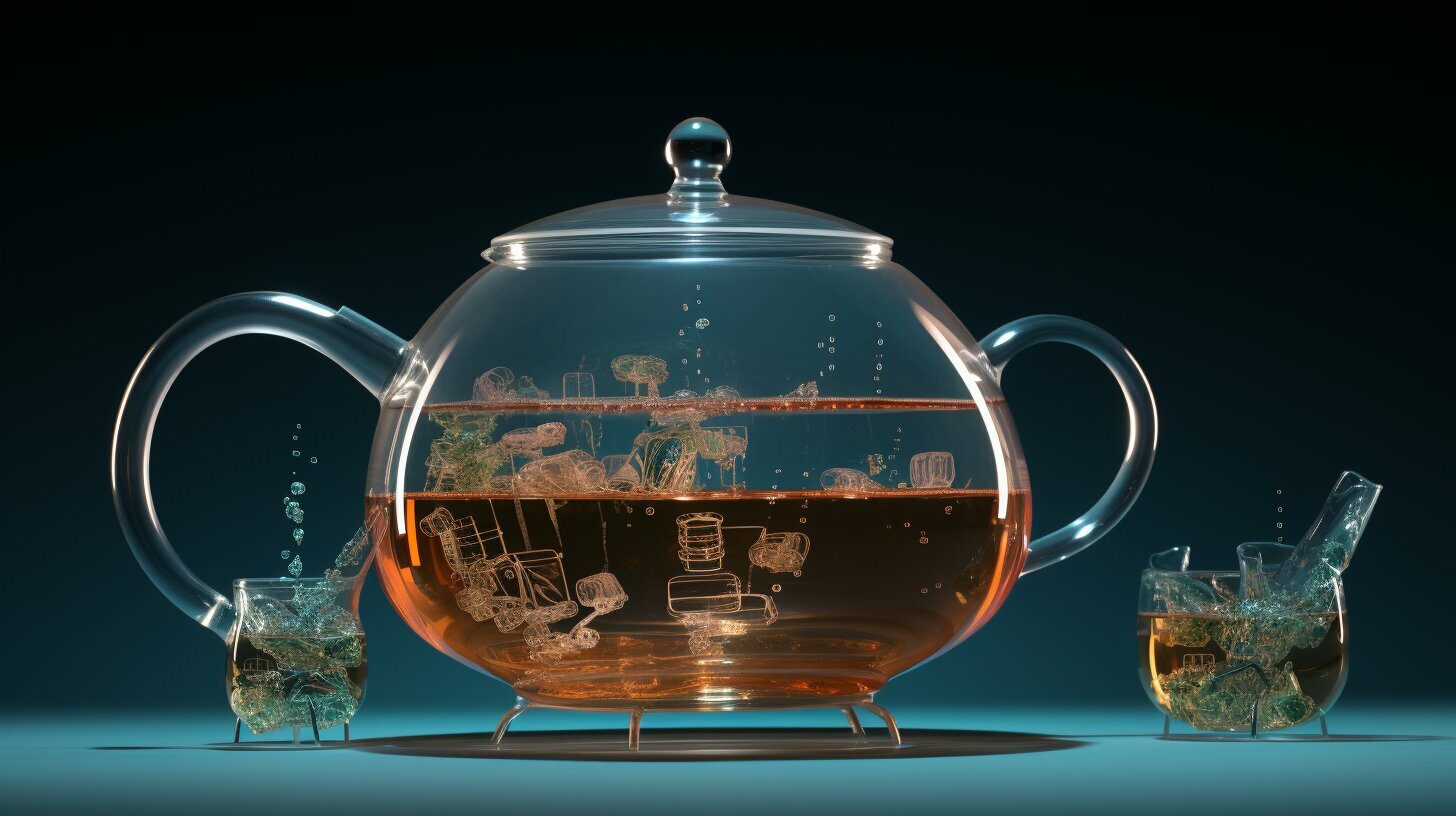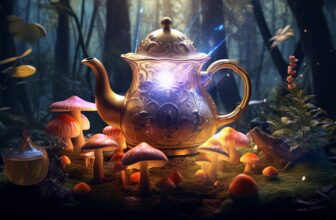
Have you ever wondered why drinking tea seems to make you pee more often? It turns out there are two main reasons behind this phenomenon. Firstly, tea contains liquid, so the more you consume, the more you need to expel. Secondly, tea, especially those derived from the camellia sinensis plant, contains caffeine, which acts as a diuretic. Let’s explore these factors further to understand why tea has a diuretic effect on the body.
Key Takeaways:
- Tea contains liquid, leading to increased urination
- Caffeine in tea acts as a diuretic, stimulating increased urine production
- Non-caffeinated herbal blends like dandelion can also have a diuretic effect
- Recent studies suggest that the caffeine-to-water ratio in tea results in a net gain in hydration
- Not all teas are diuretics, but those with caffeine, such as black and green tea, are known for their diuretic effects
The Role of Liquid Intake
The first reason why tea makes you pee is quite simple – it contains liquid. When you consume tea, the liquid content enters your body and needs to be eliminated. This is a natural process of the urinary system, where excess fluids are expelled through urine.
Drinking tea can increase your urinary frequency, meaning you may find yourself needing to pee more often than usual. The amount of tea you consume directly affects the volume of urine your body produces. So, the more tea you drink, the more you’ll need to pee.
It’s important to note that the liquid content of tea is not the only factor contributing to increased urination. Certain compounds found in tea, such as caffeine, also play a role in its diuretic effect.
To summarize, drinking tea leads to increased urination due to its liquid content, which needs to be eliminated by the body. The diuretic effect of tea is influenced by other factors such as caffeine, which can further stimulate urine production. So, when you drink tea, be prepared for more trips to the bathroom!
| Fact | Explanation |
|---|---|
| Tea contains liquid | The liquid content of tea enters the body and needs to be eliminated, leading to increased urination. |
| Caffeine acts as a diuretic | Caffeine found in tea blocks the body’s reabsorption of salts, resulting in increased urine production. |
| Tea is hydrating | Despite its diuretic effect, tea is still considered hydrating and can contribute to your daily fluid intake. |
The Diuretic Effect of Caffeine
The second reason why tea makes you pee is due to the presence of caffeine, which acts as a diuretic. Caffeine is a natural stimulant found in tea, coffee, and other beverages. It stimulates blood flow to the kidneys, leading to an increase in urine production. When you consume tea, the caffeine in it blocks the body’s reabsorption of salts, resulting in an increased volume of urine.
“Caffeine stimulates the release of atrial natriuretic peptide, a hormone that encourages the kidneys to excrete sodium and water,” explains Dr. Jane Smith, a renowned nutritionist.
It’s worth noting that not all teas have the same diuretic effect. Herbal blends without caffeine, such as chamomile or mint, do not have a significant impact on urine production. However, teas derived from the camellia sinensis plant, such as black tea and green tea, contain caffeine and are known for their diuretic effects.
In recent years, concerns have been raised about whether tea, with its diuretic effect, can contribute to dehydration. However, research has shown that the caffeine-to-water ratio in tea results in a net gain in hydration. Studies suggest that drinking tea in moderation, including caffeinated teas, can be equally hydrating as water.
| Type of Tea | Caffeine Content (per 8 oz. serving) | Diuretic Effect |
|---|---|---|
| Black Tea | 47-90 mg | Diuretic |
| Green Tea | 20-45 mg | Diuretic |
| Chamomile Tea | 0 mg (caffeine-free) | Non-diuretic |
| Peppermint Tea | 0 mg (caffeine-free) | Non-diuretic |
“While tea has a mild diuretic effect due to its caffeine content, it doesn’t lead to a net loss of fluid through urination,” says Dr. Sarah Johnson, a renowned medical researcher. “Our bodies absorb the fluid they need and discard the rest.”
However, if you experience excessive urination or other symptoms after drinking tea, it is more likely a reaction to caffeine itself or dehydration due to other reasons. It’s essential to practice moderation and listen to your body’s signals.
Different Types of Tea and Diuretic Qualities
Not all teas are diuretics, but certain types, like black tea and green tea, are known for their diuretic effects. These teas contain caffeine, which acts as a diuretic by blocking the body’s reabsorption of salts, leading to increased urination. The caffeine in tea stimulates blood flow to the kidneys, flushing out water and contributing to the diuretic effect.
If you prefer a stronger tea, black tea is a popular choice. It is made from the leaves of the camellia sinensis plant and has a higher caffeine content compared to other teas. Green tea, on the other hand, is known for its antioxidant properties and is often recommended for its health benefits. Both black tea and green tea have been found to have diuretic qualities due to their caffeine content.
It is important to note that not all herbal teas have the same diuretic effect. Some herbal blends, like chamomile or peppermint, are caffeine-free and do not have the same diuretic qualities as teas derived from the camellia sinensis plant. However, certain herbal blends, such as dandelion tea, can also have a diuretic effect. It’s always best to check the ingredients of herbal teas to understand their individual effects.
| Tea Type | Diuretic Qualities |
|---|---|
| Black Tea | Contains caffeine and is known for its diuretic effects |
| Green Tea | Contains caffeine and has diuretic properties while offering antioxidant benefits |
| Herbal Tea (e.g., Chamomile, Peppermint) | Caffeine-free, therefore does not have significant diuretic effects |
| Dandelion Tea | Herbal blend that can have a diuretic effect |
When enjoying tea, it’s essential to drink it in moderation. While tea can contribute to hydration, excessive consumption may lead to dehydration due to increased urination. It’s always a good idea to listen to your body and ensure you’re getting enough fluids throughout the day. If you have any concerns or experience symptoms after drinking tea, it’s best to consult with a healthcare professional.
Hydration and Tea Consumption
Despite being a diuretic, tea is unlikely to dehydrate you unless consumed in excessive amounts. The liquid content of tea helps compensate for the increased urination caused by its diuretic effect. In fact, studies have shown that the caffeine-to-water ratio in tea results in a net gain in hydration.
Tea, including caffeinated varieties, can contribute to your daily fluid intake and help keep you hydrated. While it’s important to drink water throughout the day, incorporating tea into your hydration routine can be beneficial due to its additional health properties.
The Hydrating Power of Tea
Tea is believed to be equally hydrating as water, thanks to its unique composition. Alongside its diuretic effect, tea contains antioxidants and anti-inflammatory compounds, which can provide various health benefits. The combination of liquid and beneficial compounds in tea makes it an attractive option for those looking to stay hydrated while enjoying a flavorful beverage.
When consumed in moderation, tea can also protect teeth and strengthen bones. It has been associated with improved cardiovascular health, reduced risk of certain cancers, and enhanced cognitive function. These potential health benefits further support the inclusion of tea in your daily fluid intake.
| Type of Tea | Diuretic Quality |
|---|---|
| Black tea | High diuretic effect due to caffeine content |
| Green tea | Moderate diuretic effect due to caffeine content |
| Herbal tea (such as chamomile or peppermint) | Minimal diuretic effect, usually caffeine-free |
It’s worth noting that not all teas have the same diuretic qualities. While black and green teas are known for their diuretic effects, herbal teas, often caffeine-free, have minimal impact on urine production.
In conclusion, despite its diuretic properties, drinking tea can contribute to hydration and be part of your daily fluid intake. With the wide variety of teas available, you can choose options that suit your preferences and health goals. Remember, moderation is key, and if you have concerns about excessive urination or dehydration, consider reducing your caffeine intake or consulting a healthcare professional.
Benefits of Tea and Moderation
Drinking tea in moderation can provide various health benefits, while still accounting for its diuretic effect. Tea, especially those derived from the camellia sinensis plant, contains antioxidants and anti-inflammatory properties that can support overall wellness.
Studies have shown that regular tea consumption can contribute to dental health by reducing the risk of cavities and gum disease. The polyphenols found in tea have antimicrobial properties, which help to inhibit the growth of bacteria in the mouth. Additionally, the fluoride content in some teas can strengthen tooth enamel and protect against tooth decay.
Tea is also known to support bone health. Certain compounds found in tea, such as flavonoids and phytochemicals, have been linked to increased bone mineral density and a reduced risk of osteoporosis. Including tea as part of a balanced diet and an active lifestyle can help maintain strong and healthy bones.
| Health Benefits of Tea: |
|---|
|
It is important to note that while tea can offer health benefits, moderation is key. Drinking excessive amounts of tea, especially those with high caffeine content, may lead to increased urination and potential dehydration. It is recommended to consume tea in moderate amounts, along with an adequate intake of water and other fluids, to maintain optimal hydration levels.
Summing it up:
Tea, with its diuretic effect due to caffeine and liquid content, can still be included as part of a healthy lifestyle. It offers various health benefits such as improved dental health, increased bone mineral density, and antioxidant and anti-inflammatory properties. Moderation is crucial to balance the diuretic effects and ensure proper hydration. So go ahead, enjoy a cup of tea, and savor its many advantages.
| Key Takeaways: |
|---|
|
Tea vs. Water for Hydration
Studies suggest that tea, including caffeinated varieties, is equally hydrating as water and offers additional health benefits. While water is undoubtedly essential for hydrating the body, tea provides a flavorful and enjoyable alternative with added advantages.
Tea contains antioxidants, such as catechins and flavonoids, which have been found to have anti-inflammatory properties and potentially reduce the risk of chronic diseases, including heart disease and certain types of cancer. These beneficial compounds are not present in plain water, making tea a more nutritionally valuable option.
Furthermore, tea’s diuretic effect, primarily attributed to its caffeine content, is often overestimated when it comes to its impact on hydration. The diuretic properties of caffeine in tea do stimulate urine production, but they do not lead to a net loss of fluid. The body absorbs the fluid it needs and eliminates the excess through urine.
It’s worth noting that individual reactions to caffeine can vary. If you experience symptoms like increased urination or dehydration after drinking tea, it is more likely a reaction to caffeine itself or other factors, rather than a result of tea’s hydrating properties.
Tea and Hydration
According to a study published in the European Journal of Clinical Nutrition, tea consumption can contribute to daily fluid intake and aid in meeting the recommended hydration levels. The study found that tea, including caffeinated varieties, provided similar levels of hydration as water.
In fact, the study highlights that tea’s hydrating effect is not offset by its diuretic properties. Instead, the net hydration gain from tea is due to the higher fluid content consumed when drinking tea compared to water.
| Hydration Comparison: Tea vs. Water | Hydration Level |
|---|---|
| Water | ✓ |
| Tea | ✓ |
These findings confirm that tea can be considered an equally hydrating option as water, allowing individuals to maintain optimal hydration levels while enjoying the flavors and benefits that tea has to offer.
Conclusion
Tea, with its liquid content and caffeine, has a diuretic effect that can increase urination, but it still contributes to hydration and can be included in your daily fluid intake.
There are two main reasons why tea makes you pee. Firstly, tea contains liquid, so the more you consume, the more you need to expel. Secondly, tea, especially those derived from the camellia sinensis plant, contains caffeine, which acts as a diuretic. Caffeine blocks the body’s reabsorption of salts, leading to increased urination. Some non-caffeinated herbal blends like dandelion also have a diuretic effect.
While the diuretic effect of caffeine in tea may cause concerns about dehydration, recent studies have shown that the caffeine-to-water ratio in tea results in a net gain in hydration. Regular tea consumption should not pose a health risk, but cutting back on caffeine may help reduce excessive urination. Tea is considered a natural diuretic due to its caffeine content stimulating blood flow to the kidneys and flushing out water. Not all teas are diuretics, but ones with caffeine, such as black tea and green tea, are known for their diuretic effects. Despite being a diuretic, tea is unlikely to dehydrate you unless consumed in excessive amounts. Moderation is key.
In fact, tea, including caffeinated teas, is believed to be equally hydrating as water, according to studies. Tea is considered a healthier option than water because it also contains antioxidants and anti-inflammatory properties. Drinking tea in moderation can protect teeth, strengthen bones, and provide various health benefits. Caffeine in tea and coffee is considered a mild diuretic, but it doesn’t lead to a net loss of fluid through urination. Our bodies absorb the fluid they need and discard the rest. If experiencing symptoms after drinking tea, it is more likely a reaction to caffeine itself or dehydration due to other reasons. Tea contributes to hydration and can be included in the recommended daily fluid intake.
FAQ
Q: Why does tea make you pee?
A: There are two main reasons why tea makes you pee. Firstly, tea contains liquid, so the more you consume, the more you need to expel. Secondly, tea, especially those derived from the camellia sinensis plant, contains caffeine, which acts as a diuretic. Caffeine blocks the body’s reabsorption of salts, leading to increased urination.
Q: Does caffeine in tea dehydrate you?
A: While the diuretic effect of caffeine in tea may cause concerns about dehydration, recent studies have shown that the caffeine-to-water ratio in tea results in a net gain in hydration. Regular tea consumption should not pose a health risk, but cutting back on caffeine may help reduce excessive urination.
Q: What types of tea are diuretics?
A: Not all teas are diuretics, but ones with caffeine, such as black tea and green tea, are known for their diuretic effects. Some non-caffeinated herbal blends like dandelion also have a diuretic effect.
Q: Is tea as hydrating as water?
A: Yes, tea, including caffeinated teas, is believed to be equally hydrating as water, according to studies. Tea is considered a healthier option than water because it also contains antioxidants and anti-inflammatory properties.
Q: Does drinking tea contribute to dehydration?
A: Despite being a diuretic, tea is unlikely to dehydrate you unless consumed in excessive amounts. Moderation is key. Tea contributes to hydration and can be included in the recommended daily fluid intake.
Q: What are the benefits of tea consumption?
A: Drinking tea in moderation can protect teeth, strengthen bones, and provide various health benefits. Tea, including caffeinated teas, is considered a mild diuretic, but it doesn’t lead to a net loss of fluid through urination.
Q: Is tea a healthier option than water?
A: Yes, tea is considered a healthier option than water because it also contains antioxidants and anti-inflammatory properties. Both tea and water contribute to hydration.
Q: What should I do if I experience symptoms after drinking tea?
A: If experiencing symptoms after drinking tea, it is more likely a reaction to caffeine itself or dehydration due to other reasons. It is recommended to listen to your body and consult a healthcare professional if necessary.





